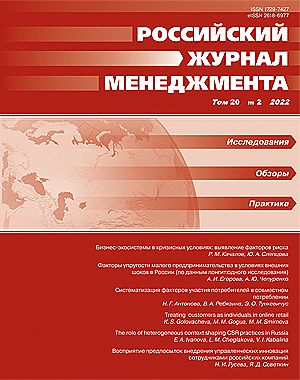Factors of the resilience of small businesses under external shocks in Russia (based on the longitudinal study data)
DOI:
https://doi.org/10.21638/spbu18.2022.202Abstract
Goal: this article analyzes the impact of a number of factors of a different nature on the financial and economic “resilience” of the business of Russian small entrepreneurs during the period of external shocks (Pandemic, situation across Ukraine).
Methodology: the empirical base of the papers consist of the data of five waves of small business longitudinal study (initial number — 750 people), implemented in 2021–2022 by the Foundation “Public Opinion”. To analyze the panel data, multinomial logistical regression with fixed effects was chosen (FE-model).
Findings: the article shows that: the age of the business is not a significant factor that can explain the resilience of the business reaction to external shocks; the larger the market, the higher the likelihood that
the business will either be sustainably developing even during shocks, or will perform resiliently under external shocks; opportunity driven motivation is more likely to promote resilience than necessity driven motivation, and is more often typical for entrepreneurs whose businesses are even growing under external shocks; the use of innovations does not lead to business resilience under external shocks — at least on the materials of the available panel of respondents.
Originality and contribution: the paper’s contribution to the existing literature consists of following. First, it is the first attempt to differentiate several factors which presumably might affect SMEs resilient reaction on external shocks taking the dynamics of their behavior, but not basing on the data of a one-time study. It came out that neither the age of business, nor the use of innovative solutions have any prolonged impact on it. Moreover, the share of resilient businesses led by entrepreneurs driven by the opportunity to increase their income is similar to those necessity driven entrepreneurs, while IDO entrepreneurs it is much higher. The finding that the volume of the market is positively connected with the resilience during shocks confirms the importance of studying the effects of the volume of businesses’ operations on its stable performance. The limitation of the study is as a relatively short period of observation (July 2021 — July 2022).
Keywords:
small entrepreneurship, resilience factors, pandemic COVID-19, longitudinal survey, quantitative analysis, Russia,
Downloads
Downloads
Published
How to Cite
Issue
Section
License
Articles of the Russian Management Journal are open access distributed under the terms of the License Agreement with Saint Petersburg State University, which permits to the authors unrestricted distribution and self-archiving free of charge.





